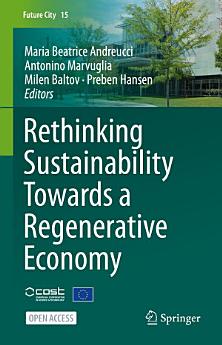Rethinking Sustainability Towards a Regenerative Economy
About this ebook
This book is one step on the way to a paradigm shift towards restorative sustainability for new and existing buildings. The authors want to promote forward thinking and multidisciplinary knowledge, leading to solutions that celebrate the richness of design creativity. In this vision, cities of the future will enhance users’ experience, health and wellbeing inside and outside of buildings, while reconciling anthropic ecosystems and nature.
A valuable resource for scientists and students in environmental sciences and architecture, as well as policy makers, practitioners and investors in urban and regional development.
About the author
Antonino Marvuglia holds a Ph.D. in Environmental Applied Physics (2007) from the University of Palermo (Italy). In 2009 he has been a Marie Curie research fellow at the University College Cork (Ireland), where he worked in the framework of the project CREEDS (Constraint Reasoning Extended to Enhance Decision Support). Since 2010, he is a researcher in the Grand Duchy of Luxembourg, currently working as a Senior Research and Technology Associate at the Luxembourg Institute of Science and Technology (LIST). His main research interests are at the intersection between life cycle assessment (LCA), data analytics (including machine learning) and simulation for sustainability assessment. He has been Management Committee (MC) member of the COST Actions “Mining the European Anthroposphere” and “Mathematical and Computer Science Methods for Food Science and Industry”. He is currently MC member of the COST Actions “Rethinking Sustainability Towards a Regenerative Economy” and “Positive Energy Districts European Network”. He has published about 50 peer-reviewed articles in international scientific journals and 10 bookchapters, in addition to numerous other research products (reports, conference proceedings, etc.). He is member of the editorial board of the Journal of Environmental Accounting and Management (Associate editor for “Computational Sustainability”) and of Renewable & Sustainable Energy Reviews (for the topic “Stochastic Optimisation in Energy Systems”). He has delivered talks to about 40 different events between international conferences, colloquia, workshops.
Milen Baltov, Ph.D., went through a transition from entrepreneur and consultant to small and medium-sized enterprises, to the world of academia. He is an expert in evaluation and monitoring of support schemes to the public administration, transport, infrastructure and the cross-border cooperation programmes. For 25 years he has been an expert and a team leader in capacity building and business promotion projects for several EU applicant countries, with missions in Macedonia, Croatia and Kazakhstan. He has been Memberof the Management Committee and working group leader in the COST Actions: “The effective design and delivery of megaprojects in the European Union”, “The EU in the new complex geography of economic systems: models, tools and policy evaluation”, and "Rethinking Sustainability Towards a Regenerative Economy", supported by the EU FP7 and FP8 (Horizon 2020) programmes. Currently, he is deputy Chair of a WG in "А pan-European network for marine renewable energy", and Member of the MC of “Multi-disciplinary innovation for social change" COST Actions (EU Horizon 2020 financed). Member of the Assembly to the mission board for “Healthy Oceans, Seas, Coastal and Inland Waters” in the next Horizon Europe programme design, and a co-chair of the “Stakeholders” WG on “Black Sea Strategy for Research and Innovation Agenda.” He is a professor and Vice Rector of the Burgas Free University, and represents Bulgaria in the Programming Committee for “SMEs and Access to Risk Finance”, introducing the EIC instruments under the EU Horizon 2020, and next Horizon Europe programmes.
Preben Hansen is a Docent and Associate Professor in Human-Computer Interaction (HCI) at the Stockholm University, Department of Computer and Systems Sciences. He is also a Visiting Professor at Peking University and a Research Fellow at University of Illinois, Urbana-Champaign, USA. Before entering the academy, he worked at SICS (Swedish Institute of Computer Science, now RISE). Preben Hansen pursues national and international research in the intersection of Human-Computer Interaction, Industrial Design and Information Access focusing on how humans use, experience, and live with collaborative technologies and interactive artefacts. In this line of research, he has been involved in national projects with funding from companies like Ericsson, Telia, SAAB, ABB and Bombardier. Internationally, he currently participates in the following EU-project: RESTORE and has worked in the following EU-COST projects: CyberParks, KEYSTONE, KNOWeSCAPE, MUMIA and has participated in the following large FP7 EU-projects: PROMISE (2010- 2013), ASSETS (2010-2012), COMPANIONS; DELOS NoE 2; CLARITY, DUMAS, SCHOLNET and DELOS-NoE. Preben Hansen regularly serves as Chair of the international ACM and IEEE Conferences, and as a Program Committee (PC) member for several conferences. He has also worked as reviewer for several ACM/IEEE journals. He is currently supervising several national as well as international Master and PhD students within the area of HCI and has authored over 120 articles in journals and conferences as well as co-edited 3 books.






